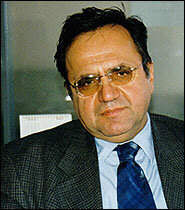 RELATIONS WITH NEIGHBOURS RELATIONS WITH NEIGHBOURS |
Macedonia's relations with its four neighbours are of paramount importance for the country, not just in themselves but also in connection with future integration into European and Transatlantic structures. However, there are critical issues with all four neighbours. As long as those are not resolved, Macedonia's position will be inherently unstable.

The new government pledged to lead a "balanced regional policy" based on "friendly relations and close co-operation with [all] four neighbours." Prime Minister Ljubco Georgievski stressed that contacts with these states and resolution of open issues -based on equal relations and mutual respect- are priorities of the Macedonian foreign policy. He also stressed the need for regional co-operation in the fields of security, communications, and energy.
 Greece: the largest foreign investor in Macedonia Greece: the largest foreign investor in Macedonia |
Relations with Greece are of paramount importance for Macedonia. Its Southern neighbour is, after all, the only Balkan country, which is a member of both NATO and the EU. This means that good relations with Greece may help Macedonia to come closer to these organizations.

Relations with Greece have considerably improved, not only economically but also politically, since the signing of the Interim Agreement in September 1995. Macedonia changed its flag, which the Greeks claimed symbolized possible territorial claims against them because it included the ancient Macedonian Star of Vergina. Macedonia also changed its constitution in order to clarify that it had no territorial design on the Greek province of Macedonia.
But there is still one major unresolved issue, which is Macedonia's name in itself. Greece still refuses to recognize its Northern neighbour under the name of Republic of Macedonia. Bilateral talks brokered by the UN have been going on for several years, but so far no agreement has been reached. Macedonia keeps insisting that its "constitutional name" should be internationally recognized and used, while Greece is at best willing to accept that Macedonia adopts a new "composed name" such as Northern Macedonia, Vardar Macedonia, or New Macedonia.
When Macedonia declared its independence, Athens might easily have got what it would accept now. But back then, the Greek government insisted that the word Macedonia should be dropped from the country's name altogether. Now, time is working for Macedonia and against Greece, and it seems that the current Greek government finally realized this.
Recently, there has been speculation that Skopje and Athens might be close to finally reaching an agreement on the name issue. Greek newspapers claim that a breakthrough might be reached very soon, and that Macedonia may be willing to accept the Greek proposal to change its name to "Republic of Macedonia-Skopje." Greek Foreign Minister Theodoros Pangalos reportedly admitted that the argument between Greece and Macedonia "was a monumental idiocy" of the Greek side. In that context, Macedonian Foreign Minister Srdjan Kerim says "the relations between Macedonia and Greece are a perfect lesson for students, politicians and intellectuals of how one can, even on the Balkans, transform relations from hostile to friendly."

"Most of our clients are from Greece, the Greek investors are the most active ones in our country," Country Managing Partner of Ernst & Young - Skopje Tito Belicanec says. |  Bulgaria - Macedonia: getting rid of "symbolism" Bulgaria - Macedonia: getting rid of "symbolism" |
As with Greece, relations between Macedonia and Bulgaria are currently dominated by a largely "symbolic" issue. While Bulgaria was the first country to recognize Macedonia as an independent state on 15 January 1992, it has yet to recognize the existence of a Macedonian nation and of a Macedonian language. As a result, around two dozen bilateral agreements have been initialized but not ratified because Bulgaria rejects Macedonia's demands that the official documents be done in both Bulgarian and Macedonian.
Another logical consequence of Bulgaria's stance is that Sofia denies the existence of an ethnic Macedonian minority on its territory, especially in the Southwestern part known as "Pirin Macedonia." Ethnic Macedonian nationalist organizations based in Bulgaria have failed to be registered by the authorities and continue to operate more or less illegally.
During the term of the previous Macedonian government, relations between Skopje and Sofia were always a bit uneasy. It remains to be seen whether Georgievski's government will bring about an improvement. Bulgaria had pinned its hopes on an opposition victory, and consequently the government in Sofia welcomed the outcome of the Macedonian elections. Congratulating Georgievski on his election as Prime Minister, Bulgarian Premier Ivan Kostov said this opened "a new page in bilateral relations."
Former Bulgarian President Zhelyu Zhelev recently tried to break the ice on the issues of nation and language. In a lecture at the American University in Bulgaria (based in Blagoevgrad in Pirin Macedonia) and in an interview for the Sofia daily 24 chasa, he noted that Bulgaria has no right to dictate the Macedonians their national identity. Zhelev said that "since the citizens of Macedonia… [Identify] themselves as Macedonians, and not as Bulgarians, Bulgaria as a democratic country is obliged to respect this choice." However, Zhelev questioned the existence of a distinct Macedonian language and proposed that bilateral agreements be done "in the official languages of the two countries," a suggestion that the Macedonian side earlier rejected.
Zhelev's suggestion is a first step and points to a possible resolution of open issues between Macedonia and Bulgaria.
 Yugoslavia - Macedonia: traditional friendship for the new generations Yugoslavia - Macedonia: traditional friendship for the new generations |

Main comment regarding the relations between Macedonia and Federal Republic of Yugoslavia, was that despite the five decades of living together in a common country, "caution is necessary as a result of the unpredictability of events in the Yugoslav crises, the vicinity and the common border with Kosovo." However, after the Skopje Summit of the South East Europe Process for Cooperation held on February 22nhis comment lood 2001, this comment lost part of its significance. Namely, at the Skopje SEECP Summit, Macedonia and Yugoslavia ratified the joint agreement for demarcation, by which the last critical issue between the two countries was solved.
Macedonia, as the President Trajkovski said on this occasion, gave a unanimous and clear support to the new democratic leadership of this country.
According to Minister Srdjan Kerim the elections in FR Yugoslavia marked the beginning of the democratic changes in this country, and these changes had a very positive influence on the overall security, stability and cooperation in the SEE region. Macedonia and Yugoslavia should now improve the cooperation in the field of energy, building of the modern Corridor-10 (one of the most important roads and railway routes in Europe), and in the field of trade. All measures should be taken so as the Free Trade Agreement between the two countries functions properly.
"With the demarcation of the border, the last open issue between Macedonia and Yugoslavia is solved," commented Prime Minister Ljubco Georgievski after this event.
 Albania: opportunities for future co-operation Albania: opportunities for future co-operation |
With Albania, the status of ethnic Albanians in Macedonia (and the much smaller ethnic Macedonian community living in Albania) will always have an effect on bilateral relations. On the whole, however, bilateral relations are reasonably good, despite complaints of Macedonia's ethnic Albanians about their status. This is mainly due to the fact that both governments exercise restraints, and do not try to capitalize on existing problems for short-term political gains at home.
Obviously, further stabilization of Albanian-Macedonian relations will mainly depend on two factors. One is the status of ethnic Albanians in Macedonia. The other is internal stability in Albania, which is always threatened by bouts of anarchy, and the inability of the main political actors to cooperate.
However, both Macedonia and Albania are aware that the future lies in the cooperation. For the sake of the truth, this cooperation is far under the desired level, but there is progress. On one hand, Macedonia's closest seaport is the one in Korca. Albania, on the other hand, is aware of the opportunities in Macedonia.
Currently, the two countries, including Greece, are involved in the greatest environmental project in the Balkans - the Prespa Park. So, if one can cooperate in regard to the environment, why should the economic cooperation be impossible? |

